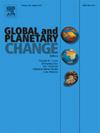ENSO exacerbated the impact of compound dry–hot events on maize yield over China during 1961–2020
IF 4
1区 地球科学
Q1 GEOGRAPHY, PHYSICAL
引用次数: 0
Abstract
Increasing compound dry and hot events (CDHEs) have become a leading risk to regional and global crop production. While numerous accounts of crop growth or yield response to climate extremes exist, impacts of CDHEs on crop yield are not well quantified, especially for that associated with large-scale modes of climate variabilities. Here we address this issue by using statistical maize yield data over China with a special focus on the impact of El Niño–Southern Oscillation (ENSO). We find that over 1961–2020, CDHEs led to significant yield reduction by 4 %, while it was aggravated to 6 % by the concurrent ENSO. Mechanisms for this underscored the role of ENSO in modulating CDHE characteristics wherein land–atmosphere feedbacks significantly contributed to yield loss. Compared to early stage of growth, ENSO in conjunction with compound events triggered more substantial maize yield losses during the late stage. Furthermore, this amplified risk was observed to intensify in recent decades. Note that agronomic practices, like irrigation, could significantly offset these negative impacts on maize yield. These findings highlight the great threat of CDHEs to maize yield as well as the key role of ENSO in driving this process, and may offer insights for yield prediction and agricultural management.
ENSO加剧了复合干热事件对1961-2020年中国玉米产量的影响
日益严重的复合干热事件(CDHEs)已成为区域和全球作物生产的主要风险。虽然有许多关于作物生长或产量对极端气候反应的描述,但复合干热事件对作物产量的影响还没有很好地量化,尤其是与大规模气候变异模式相关的影响。在此,我们利用中国的玉米产量统计数据来解决这一问题,并特别关注厄尔尼诺-南方涛动(ENSO)的影响。我们发现,在 1961-2020 年间,CDHEs 导致玉米大幅减产 4%,而同时发生的厄尔尼诺-南方涛动则使减产幅度增加到 6%。其机理强调了厄尔尼诺/南方涛动在调节CDHE特征方面的作用,其中陆地-大气反馈在很大程度上导致了减产。与玉米生长初期相比,厄尔尼诺/南方涛动与复合事件共同引发的玉米产量损失在后期更为严重。此外,据观察,这种风险的扩大在近几十年来有所加剧。需要注意的是,灌溉等农艺措施可以显著抵消这些对玉米产量的负面影响。这些发现凸显了CDHEs对玉米产量的巨大威胁以及厄尔尼诺/南方涛动在这一过程中的关键作用,并可能为产量预测和农业管理提供启示。
本文章由计算机程序翻译,如有差异,请以英文原文为准。
求助全文
约1分钟内获得全文
求助全文
来源期刊

Global and Planetary Change
地学天文-地球科学综合
CiteScore
7.40
自引率
10.30%
发文量
226
审稿时长
63 days
期刊介绍:
The objective of the journal Global and Planetary Change is to provide a multi-disciplinary overview of the processes taking place in the Earth System and involved in planetary change over time. The journal focuses on records of the past and current state of the earth system, and future scenarios , and their link to global environmental change. Regional or process-oriented studies are welcome if they discuss global implications. Topics include, but are not limited to, changes in the dynamics and composition of the atmosphere, oceans and cryosphere, as well as climate change, sea level variation, observations/modelling of Earth processes from deep to (near-)surface and their coupling, global ecology, biogeography and the resilience/thresholds in ecosystems.
Key criteria for the consideration of manuscripts are (a) the relevance for the global scientific community and/or (b) the wider implications for global scale problems, preferably combined with (c) having a significance beyond a single discipline. A clear focus on key processes associated with planetary scale change is strongly encouraged.
Manuscripts can be submitted as either research contributions or as a review article. Every effort should be made towards the presentation of research outcomes in an understandable way for a broad readership.
 求助内容:
求助内容: 应助结果提醒方式:
应助结果提醒方式:


